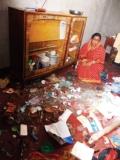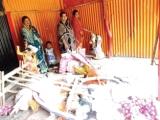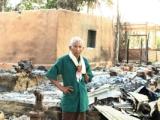Archives
Minority Persecution in Bangladesh:
In their report, Amnesty International stated, ‘Amnesty International has been concerned about the situation of the members of the Hindu community in Bangladesh over the past several months. Following the general election on 1st October which was won by a coalition led by Bangladesh Nationalist Party (BNP) with the largest majority, BNP supporters reportedly attacked Hindus because of their perceived support for the rival Awami League party during the elections. Hundreds of Hindu families were reportedly driven off their land by groups affiliated to the BNP-led coalition who, in some cases, allegedly burnt their homes and raped Hindu women. Several Hindus were reportedly killed.’
In this report, Amnesty International marked the more affected areas, how they are suffering and gave some case history of how the women of the Hindu community were raped.
The Amnesty International report stated, ‘Reports indicate that the worst affected areas have been in Barisal, Bhola, parts of Pirojpur, Khulna, Sathkira, Gopalganj, Bagerhat, Jessor, Commilla and Norsingdi. Attackers have reportedly entered Hindu homes, beaten members of the family, looted their property and in some cases, raped Hindu women.’ Some of the cases of the affected areas reported by Amnesty International were:
- One of the affected villages was Ziodhara. Fear of counterattack created a severe atmosphere of tension in the village. Several hundred Hindu villagers left for fear of being attacked and Hindu children would not attend schools
- In another village, Deuatala Bazar, gangs of young men wielding sharp weapons reportedly went from door to door telling Hindus to go away. Hundreds of Hindu villagers reportedly left the village.
 In the village of Daspara in Mithanala union, Mirersarai Upazila, a gang of about 25 youth reportedly attacked homes of Hindus at around midnight on 5th November. One person, Sunil Das Shndhu aged 28, was reportedly hacked to death and 16 others were injured, some seriously. They ransacked houses, looted them, dragged family members out of their homes and beat them. Police reportedly arrested 12 persons in connection with this attack, but it is not known if they have been charged.
In the village of Daspara in Mithanala union, Mirersarai Upazila, a gang of about 25 youth reportedly attacked homes of Hindus at around midnight on 5th November. One person, Sunil Das Shndhu aged 28, was reportedly hacked to death and 16 others were injured, some seriously. They ransacked houses, looted them, dragged family members out of their homes and beat them. Police reportedly arrested 12 persons in connection with this attack, but it is not known if they have been charged.
- A college student was reportedly raped in front of her mother at her home in Azimnagar, Bhanga, Faridpur. The attackers entered her home on 6th October at about 9 pm, ransacked the house, looted valuables and raped the student before leaving the house.
- A school girl was reportedly gang-raped in Delue, Ullapara, Sirajganj on 8th October. Attackers entered her home; ill-treated members of her family, took her outside the house and raped her.
- Hindu women were reportedly raped in front of their husbands on 11th October in Khanzapur Upazila in Gournadi, Barisal. The attackers reportedly came at night, knocked at the door, and told the family that they should leave the area because they voted for the Awami League. They then reportedly tied up the husbands and raped the women.
- Two Hindu women were reportedly raped in their home in Bashkandi, Chorfashon, Bhola on 6th October. Male members of the family had already gone into hiding for fear of being attacked. The attackers entered their home and raped a girl and her mother.
 These are the partial sketches of incidents, what was committed by the BNP- Jamat in 2001 but it is impossible to unearth the extent of the whole travesty. A large number of rape victims have hidden that incident due to the fear of social stigma. On the other hand the Amnesty International report also said that, a large number of people have left the country and gone to India. However, the present government has published a probe committee report of those massacres. This probe committee was formed as per the direction of the High Court. After this government came to power, a legal aid non government organization, Human Rights and Peace for Bangladesh filed a writ petition on 6th May 2009.
These are the partial sketches of incidents, what was committed by the BNP- Jamat in 2001 but it is impossible to unearth the extent of the whole travesty. A large number of rape victims have hidden that incident due to the fear of social stigma. On the other hand the Amnesty International report also said that, a large number of people have left the country and gone to India. However, the present government has published a probe committee report of those massacres. This probe committee was formed as per the direction of the High Court. After this government came to power, a legal aid non government organization, Human Rights and Peace for Bangladesh filed a writ petition on 6th May 2009.
The High court had directed the government to form a judicial probe commission. The Government had formed a three-member commission headed by retired judge Muhammad Sahabuddin. The commission submitted its report to the Home Minister on 29th April of this year. The government has formally disclosed this on 1st December 2011.
A massacre or a heavily minority persecution has happened on 1st October 2001 and now it is 2012, over a decade has elapsed. However, the fate of the minority of Bangladesh has not changed a bit. Rather, the reality is that, the Home Minister of Bangladesh had said that if the victims were afraid to file cases, the government will file cases against them.
 The probe commission found the involvement of 26,352 people including 26 minister and lawmakers of the previous Bangladesh nationalist party (BNP) – Jamat alliance government. According to the probe commission, the accused six ministers are Ruhul Quddus Talukder Dulu, Abdus Salam Pintu, Motiur Rahaman Nizami, Altaf Hossain choudhury, Tariqul Islam and Hafizuddin. Altaf Hossain Choudury who was the Home Minister at that time. If the Home Minister himself is involved or taking part in violence, what can happen in a country? Out of six ministers, two are arrested now in other cases. Motiur Raman Nizami was arrested for alleged war crimes and Abdus Salam Pintu was arrested in a grenade attack case. According to the investigation report of that grenade attack case, Abdus Salam Pintu is a leader of an Islamic terrorist group. War criminal Motiur Rahaman Nizami is also a leader of an Islamic terrorist because all the Islamic terrorist groups of Bangladesh are linked with Jammat or a sister organization of Jammat Islami Bangladesh (Jammat). Another war criminal of 1971 accused is Salauddin Quader choudhury. He is now in the jail as an accused war criminal. His trial is going on till now.
The probe commission found the involvement of 26,352 people including 26 minister and lawmakers of the previous Bangladesh nationalist party (BNP) – Jamat alliance government. According to the probe commission, the accused six ministers are Ruhul Quddus Talukder Dulu, Abdus Salam Pintu, Motiur Rahaman Nizami, Altaf Hossain choudhury, Tariqul Islam and Hafizuddin. Altaf Hossain Choudury who was the Home Minister at that time. If the Home Minister himself is involved or taking part in violence, what can happen in a country? Out of six ministers, two are arrested now in other cases. Motiur Raman Nizami was arrested for alleged war crimes and Abdus Salam Pintu was arrested in a grenade attack case. According to the investigation report of that grenade attack case, Abdus Salam Pintu is a leader of an Islamic terrorist group. War criminal Motiur Rahaman Nizami is also a leader of an Islamic terrorist because all the Islamic terrorist groups of Bangladesh are linked with Jammat or a sister organization of Jammat Islami Bangladesh (Jammat). Another war criminal of 1971 accused is Salauddin Quader choudhury. He is now in the jail as an accused war criminal. His trial is going on till now.
It is clear that, the war criminals of 1971 and the Islamic terrorist group were involved in the persecution of the minority in Bangladesh. Basically it was a religious cleansing. This was perpetrated with the help of the government and the government administration to cleanse Bangladesh of Hindus, Buddhists and Christians. So, it was not only the support of the victims for the Awami League but also an extreme fundamentalist thinking which was at work in this case. What they started in 1971, they seek to finish through the BNP government.
Now the question is – ‘How will Bangladesh get rid of this phenomenon?’ The present government is trying to pull the nation out of this crisis. They have started the trial of the war criminals of 1971. They have sought a probe commission report of minority cleansing of 2001. They have understood that, minority victims will be afraid to file cases against the involved people of 2001. As such, the government has said that it will file cases against people who don’t file their cases. On the other hand, the main opposition BNP has taken their position directly in favor of war criminals. Their party officially said that they want to abolish the tribunal, which has been set up for the trial of the war criminals. They are observing a strike in favor of their demand and they have organised a car march and rally in favor of the war criminals. Besides this, the BNP has rejected the probe commission report on minority persecution. According to media reports, they are also spending a lot of money for international lobbing to put pressure on the government of Bangladesh to stop it. But, the rational international community is in favor of the present government of Bangladesh. The present government of Bangladesh is the only force in Bangladesh which is a liberal force. Its opposition is a totally extreme fundamentalist one. Once the people of Bangladesh used to think that the BNP may be a center right party. On the other hand the USA called it a moderate Muslim party. But BNP has revealed its real face. They are now officially in favor of extreme Islamic fundamentalism. The government and the progressive people of the country have to fight to establish a secular democratic country. To establish a real secular democratic country, both war criminals and the criminals who were involved in minority persecution have to face trials. The Government of Bangladesh has to ensure justice and peace for all the religions, races and the communities of this land.

